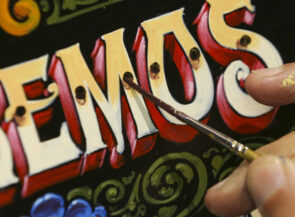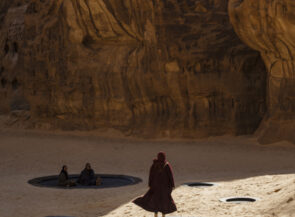The unlikely action star returns in the latest installment of Mission: Impossible
Simon Pegg appearing on a Zoom call with his arm wrapped in a bandage doesn’t come as a complete surprise. Since 2006, the British actor has appeared in five Mission: Impossible films (with a sixth in production), which are known for their extravagant action sequences. The thrill factor is ramped up further by star Tom Cruise’s insistence on doing his own stunts—and occasionally injuring himself in the process. Is it possible that Pegg is following Cruise’s lead? Pegg’s character in these films, Benji Dunn, started out as a stock action-film type: the nerdy, tech-savvy sidekick to the guy scaling the skyscrapers and beating up the baddies. Since M:i:III, however, Benji has moved on, becoming a nerdy, tech-savvy field agent who, on occasion, does a little baddie-beating of his own. This month, Pegg reprises the role in Mission: Impossible—Dead Reckoning Part One, the first installment of a two-parter that will conclude next year.
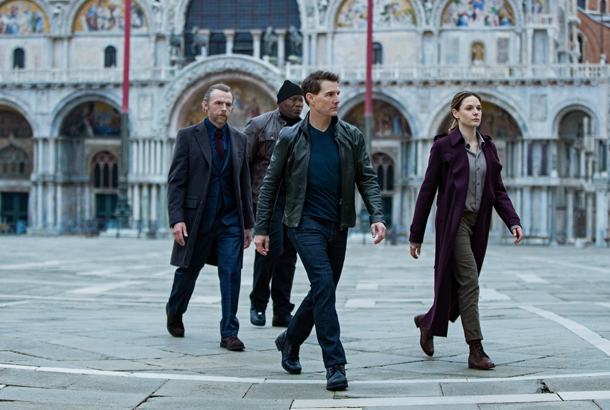
Incongruous pairings are a familiar comedic device, and Benji is a part of that tradition; as Laurel and Hardy accentuate each other’s physical dimensions, so the jittery tech geek makes the action hero seem even more heroic. Yet Pegg, as an actor, doesn’t quite fit this mold. He rose to prominence with the 2004 release of Shaun of the Dead, the first in the so-called Cornetto trilogy (alongside Hot Fuzz and The World’s End), which he cowrote with Edgar Wright. These stylized, absurdist horror comedies are packed with off-kilter fights and chases: Pegg versus flesh-eating zombies, or invading aliens, or homicidal senior citizens. He has also appeared in several Star Trek films and has a recurring role in Amazon Prime’s subversive superhero hit The Boys, so he is no stranger to visual spectacle—and he’s perhaps not the last person in the world you’d expect to suffer an on-set injury. Speaking from his home in England, Pegg tells Hemispheres about the actual cause of his damaged limb, the rationale behind Tom Cruise’s apparent death wish, and the possibility that the eighth M:I might be the last.
I have to ask: What happened to your arm?
Ah… I was snowboarding, going down quite a fast slope, and I hit a patch of slush, which caused me to stop abruptly and flipped me over like a rag doll. It was quite spectacular.
Speaking of which, in the latest Mission: Impossible, Tom Cruise does another of his death-defying stunts, hurtling up an enormous ramp on a motorcycle, flying off the edge of a cliff, and deploying a parachute halfway down—and he did that a total of six times. It’s nuts.
Tom never does anything by half, and he knows what he wants when it comes to making films. It just means a lot to him to provide audiences with a degree of authenticity that is absent from a lot of action cinema these days. We live in an era where we can reproduce reality very faithfully with VFX, but we often leave the cinema feeling a little nonplussed—the action doesn’t really wow you. I’m not bemoaning CGI, because it takes us to all sorts of amazing places, but Tom striving to deliver actual moments of peril adds a whole new dimension of tension. It reinvests cinema with a sense of danger, and it’s not just anyone doing these things—it’s Tom Cruise.
What’s the most dangerous thing you’ve done while making a film? I seem to recall a scene in Rogue Nation where you cut your finger while trying to fix a server.
Yes, there were some sharp wires in that scene [laughs]. I have had to do a few fight sequences where I’ve been accidentally punched by a stuntman, which is fun. During a shoot in the Arctic, we had to stop filming because polar bears were crossing the set—that was scary. But in terms of doing dangerous stunts, that’s Tom’s job.
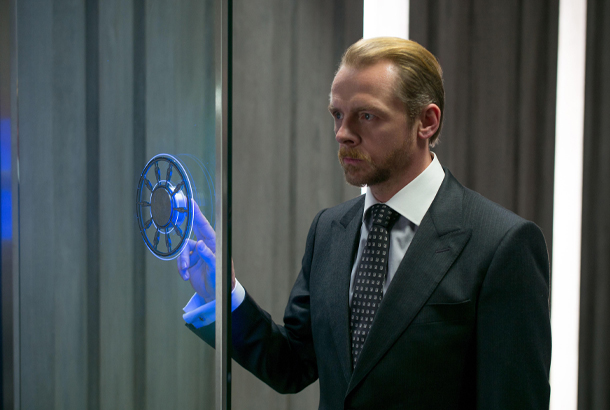
You play a familiar type in the Mission: Impossible films—the techie sidekick who serves as a foil to the fearless hero. You took the role further, though: You get to fight people now, which must be gratifying.
When I first played Benji, I had no idea he would last for 17 years. What’s been great for me is to be able to evolve the character from a lab-based techie to a full-on secret agent. But then, Benji is never going to be Ethan Hunt. He has his limits.
I don’t think it’s too controversial to say that the Mission: Impossible series really came into its own in the third installment—which, of course, is entirely down to you. I’m kidding, but you did introduce an added element of fun, which is a big part of any good action film.
That’s true, but I think the idea of Benji as pure comic relief is a reduction, because the character is more than that. A lot of the comedy in the films doesn’t come from me; it comes from the interplay within the team—the longstanding friendships, the mutual reliance, the weary acceptance of each other’s shortcomings.
Also, Tom Cruise is funnier than many give him credit for—there’s real humor in the long-suffering expressions he adopts when dangling from the side of a skyscraper or clinging to an airplane as it takes off.
Yeah, Tom is very good at that kind of comedy. He’s great at playing vulnerability. It’s really fun to watch him showing doubt or fear.
Of course, it’s also fun to watch outlandish action sequences, which is something M:I specializes in, and something you tapped into in your Cornetto trilogy—the fight with the homicidal old ladies in Hot Fuzz comes to mind.
One of the messages underlying Hot Fuzz is that this sort of ridiculous, over-the-top action is OK. I think the M:I films have their cake and eat it in that regard, because they’re very smart—with the intrigue and double-crossing—but at the same time they’re a lot of fun. None of the fireworks matter, though, if you don’t care about the characters. You need to create characters that people are invested in to make the action sing.
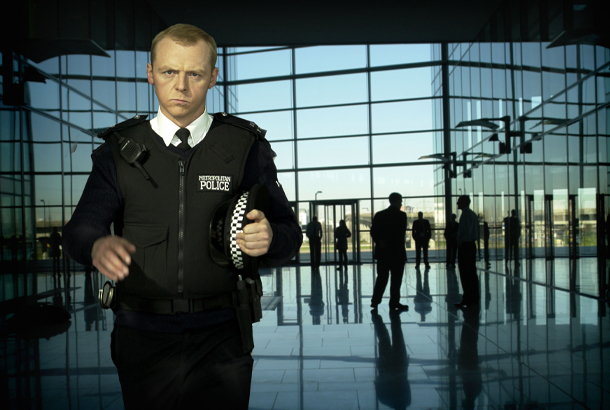
There seems to be good chemistry among the cast members.
There is a huge amount of affection that grows out of getting on with each other, and that makes its way onto the screen. Making these movies can be tense at times, but generally speaking we have great fun. It’s a hoot.
There’s been speculation that Dead Reckoning Part Two will be the last film in the series. Do you know if that’s for sure?
No, but I can’t imagine it really being the end. If it is, we’ll go out on a high.
Fans will be upset if the films don’t continue, but at the same time, there have been many examples of people not knowing when to call it quits, of things going on a little too long.
That’s where the collision of art and commerce happens. Artistically, you want to quit while you’re ahead, but Paramount as a corporation, I don’t know if they are going to want to let go of one of their most successful franchises. Then again, I would have said after we made Rogue Nation [in 2015], how are we ever going to top that? But we have done, several times.
Other than Dead Reckoning, what’s in your immediate future?
A whole bunch of things, none of which I can really discuss. I did a show for Channel 4 last year [the cyber-thriller The Undeclared War], which I think should go again. And I made a movie last year about a talking mongoose. A true story.
You also have a recurring role in the Amazon Prime series The Boys, which subverts the superhero genre in a way that’s similar to your Cornetto trilogy. Is this sort of parody something you’re particularly drawn to?
What we tried to do with those films was to take the language of cinema and apply that to parochial England. The juxtaposition of grandiose Hollywood conventions and places like Crouch End and Welwyn Garden City was the central joke to the movies. But we were never making fun of those conventions. I always balk at the idea that Shaun of the Dead is a parody of a zombie movie. It’s not—it’s a zombie movie. It just happens to be a comedy as well.
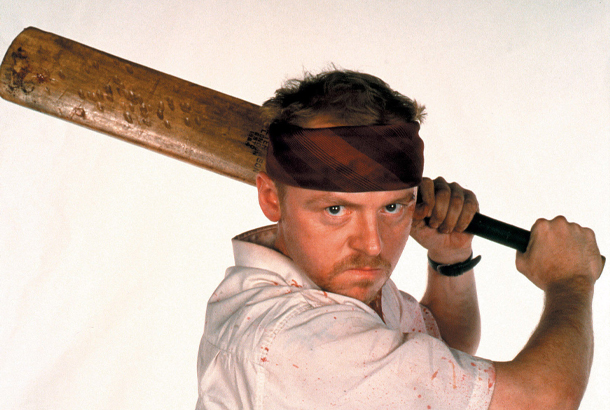
There’s a story about a reporter—while you were basking in the success of those films—asking you if you’d ever quit the U.K. and head to Hollywood, and you replying with something along the lines of, “It’s not like we’re going to go away and do, I don’t know, Mission: Impossible III.”
There’s this odd sort of binary, us-and-them perception in the film industry—that slightly proprietorial thing you get from the domestic press wherever you’re from—whereby if you go somewhere else it’s seen as a betrayal.
You had no idea you’d be making M:i:III at the time, right?
No. I think I had at some point auditioned for a version of Mission: Impossible that never made it to the screen and in which Benji didn’t exist. So maybe that was still fresh in my mind, knowing I hadn’t bagged that job. But yes, there is a bit of irony there.
A happy irony, because you’re still doing it. I read somewhere that you started out wanting to do serious drama, and I know that you also did some stand-up comedy. Looking back, has your career taken the path that you expected, or are you surprised at where you are now?
I’m always being surprised. When we made Shaun, we had no idea it would get seen outside the U.K., and then to have become part of Star Trek and Mission: Impossible… I didn’t set out to be a comedy actor when I studied drama at university. I wanted to be an actor. Now, as I get older, I just want to do challenging and interesting things. It’s not my ambition to become a superhero. I don’t want to work in front of a green screen for the rest of my life.

